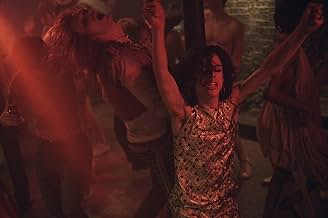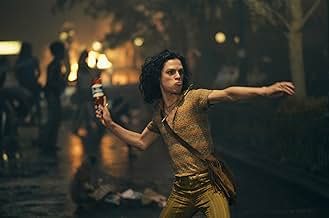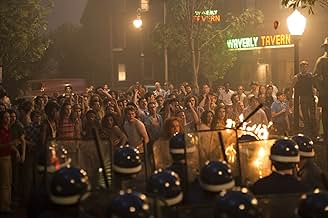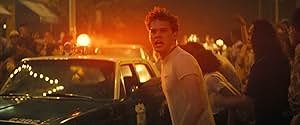IMDb RATING
5.4/10
4.6K
YOUR RATING
A young man's political awakening and coming of age during the days and weeks leading up to the Stonewall Riots.A young man's political awakening and coming of age during the days and weeks leading up to the Stonewall Riots.A young man's political awakening and coming of age during the days and weeks leading up to the Stonewall Riots.
- Awards
- 4 nominations total
Vlad Alexis
- Cong
- (as Vladimir Alexis)
- Director
- Writer
- All cast & crew
- Production, box office & more at IMDbPro
Featured reviews
Roland Emmerich's biggest mistake was calling the movie "Stonewall" and marketing it as if it were the actual story of the rebellion. It gave people the wrong expectation. It's not a movie about Stonewall. It's a movie about a Midwestern gay man whose story takes place on Christopher street at the time of the riots. It's also in part the story of the first person he meets in New York, played by Jonny Beauchamp, who steals the movie. It's basically a very oddball romance and coming-out story. People wanted an accurate historical epic about the importance of the riots, and the movie isn't that and was never meant to be.
For what it really is, it's a very good movie. Like most "historical" movies there are inaccuracies. The worst distortion is giving Danny the "first brick." That's upset a lot of people, but in the dramatic structure of the movie it's as much about Danny's becoming himself--a gay man throwing away his shame--as it is about the situation he finds himself in. The police are depicted as "bad" in the black-and-white morality of an old-fashioned hero-versus-villain Saturday morning serial. But beyond those inaccuracies and the impossibility of recreating Christopher Street as it was (which seems to be especially upsetting to some New York viewers), the movie is as faithful to its surrounding event as any Shakespeare history play to its, including sympathetic depictions of a very diverse neighborhood of LGBT types.
As a long-time gay activist, I liked the movie a great deal. It feels real as I remember things to have been 46 years ago. I felt a genuine emotional rush during and after the riot. The movie ends with typical historical clean-ups, telling us what became of the real people, like Marsha P Johnson and others who appear in the movie, and mentioning the additional nights of rioting and how they went on to be regarded in LGBT history.
For me the saddest thing about this film is the divisions it's exposed among various components of the LGBT community. This history belongs to all of us, black, brown, white, gay, lesbian, transgender, drag queen, troll, twink, and so on; if we can't honor it in all of our variations, no one else will either. Go to see it as a good story well told, not as a factual documentary. I write this knowing some of you won't be able to, some of you won't want to, and some of you won't believe me. I wish there were something I could do about that, but there isn't.
For what it really is, it's a very good movie. Like most "historical" movies there are inaccuracies. The worst distortion is giving Danny the "first brick." That's upset a lot of people, but in the dramatic structure of the movie it's as much about Danny's becoming himself--a gay man throwing away his shame--as it is about the situation he finds himself in. The police are depicted as "bad" in the black-and-white morality of an old-fashioned hero-versus-villain Saturday morning serial. But beyond those inaccuracies and the impossibility of recreating Christopher Street as it was (which seems to be especially upsetting to some New York viewers), the movie is as faithful to its surrounding event as any Shakespeare history play to its, including sympathetic depictions of a very diverse neighborhood of LGBT types.
As a long-time gay activist, I liked the movie a great deal. It feels real as I remember things to have been 46 years ago. I felt a genuine emotional rush during and after the riot. The movie ends with typical historical clean-ups, telling us what became of the real people, like Marsha P Johnson and others who appear in the movie, and mentioning the additional nights of rioting and how they went on to be regarded in LGBT history.
For me the saddest thing about this film is the divisions it's exposed among various components of the LGBT community. This history belongs to all of us, black, brown, white, gay, lesbian, transgender, drag queen, troll, twink, and so on; if we can't honor it in all of our variations, no one else will either. Go to see it as a good story well told, not as a factual documentary. I write this knowing some of you won't be able to, some of you won't want to, and some of you won't believe me. I wish there were something I could do about that, but there isn't.
I watched Stonewall last night and did not find it to be the horrible film I expected. It was not a great film either, a solid 6 out of ten. It was visually interesting, the dialog was a bit awkward and a little boring but IMO it accurately portrayed the feeling of 1969/70. Most of the characters were poor LGBT runaways living on the streets who were POC, transgender, dykes/lesbians and a variety of ethnicities. All the cops were white, mostly portrayed as assholes. Was the movie flawed? Absolutely. Perhaps the biggest flaw was calling the film Stonewall. Still I think it is worth seeing. If you can get past expectations of it being a historically correct documentary and watch it as a coming of age/out story about a young man from the country running to the city (which many did), at the end you can get a real reminder why we celebrate LGBT Pride today.
The film is derivative, as well as whitewashed.
There are so many factual goofs, when it comes to clothes, music, etc. The filmmaker needed to spend some time doing research and fact checking.
I also find fault with the film centering around a kid from Kansas. The uprising was started by Puerto Rican and African American drag queens, and there is strong support that the first police resistance was by a lesbian, not some white football player from the mid-west.
I suggest watching the British 1997 film, which really feels so much more authentic.
There are so many factual goofs, when it comes to clothes, music, etc. The filmmaker needed to spend some time doing research and fact checking.
I also find fault with the film centering around a kid from Kansas. The uprising was started by Puerto Rican and African American drag queens, and there is strong support that the first police resistance was by a lesbian, not some white football player from the mid-west.
I suggest watching the British 1997 film, which really feels so much more authentic.
I was not previously aware of the negative reviews of this film. And that is a good thing, since they might have deterred me from watching. Having now seen the film, and having done so as A) someone who is old enough to remember firsthand what it was like to be gay in middle America in 1969 (far worse than what is depicted in this film!), B) someone who was disowned and thrown out by his parents at age 17 for being gay, C) a long-time gay activist, and D) a professional historian, all I can say is that the critics need to get past the fact that this is *not* a dispassionate, objective documentary about the Stonewall Riots. Rather, it is a fictionalized evocation of the social, cultural, and political circumstances that eventually triggered the riots. And in that regard, I think the film did an outstanding job. Those born after about 1970 largely have no reason to remember bar raids, police payoffs, anti-cross-dressing laws, or even the overt involvement of organized crime in the operation of many gay bars. And that is in large part thanks to the bravery of the "deplorables" (to use a word circulating in this election cycle) who finally said, "Enough is enough." From my perspective as an elderly gay man who continues to be utterly dumbfounded (and delighted!) by the social changes that gay militants have achieved over the past half-century, I can only say "Thank you" to the makers of this film for at least trying to tell the story in a passionate, subjective manner. If you want cold, emotionless history, tune in to the National Geographical Channel. If you want some sense of what it *felt like* in 1969 (and for many years thereafter), see this film. Is the film "flawless"? No. But despite a few flaws, it is an excellent film.
This movie is a complete lie all the main characters are white even doh the people that started the movement in reality were black
Did you know
- TriviaThe Stonewall Inn or sometimes referred as Bonnie's Stonewall Inn was originally built as stables in the mid 19th century. By 1930 it became a Tearoom for heterosexuals. The Stonewall Inn first closed in 1964 after 34 year's of business as a Tearoom when the interior was destroyed by fire. It was restored by three mobsters in 1967 as a gay bathhouse and became the largest gay bar in the US. After the riots in 1969 it shortly closed. For twenty years the Stonewall ran as a Bagel Sandwich Shop, a Chinese Restaurant and shoe store before reopening in 1998 as simply Stonewall.
- GoofsThe timing of Danny's arrival in New York is confused. He leaves Indiana during the fall (it's football season, and the World Series is about to start). But his bus arrives in New York in March (3 months before the Stonewall riots).
- ConnectionsFeatured in Identités trans: Au-delà de l'image (2020)
- SoundtracksI Say A Little Prayer
Written by Hal David & Burt Bacharach
Performed by Stingray Music
Courtesy of Stingray Music c/o Covered Records, Inc.
- How long is Stonewall?Powered by Alexa
Details
Box office
- Budget
- $13,500,000 (estimated)
- Gross US & Canada
- $187,674
- Opening weekend US & Canada
- $112,834
- Sep 27, 2015
- Gross worldwide
- $292,669
- Runtime2 hours 9 minutes
- Color
- Sound mix
- Aspect ratio
- 2.35 : 1
Contribute to this page
Suggest an edit or add missing content












































